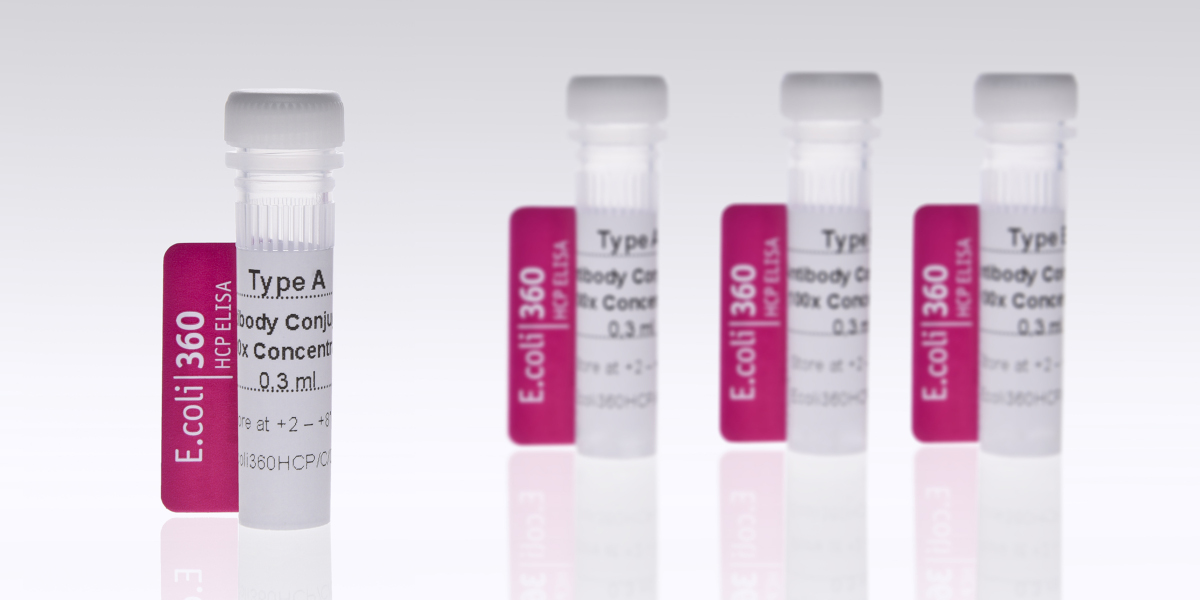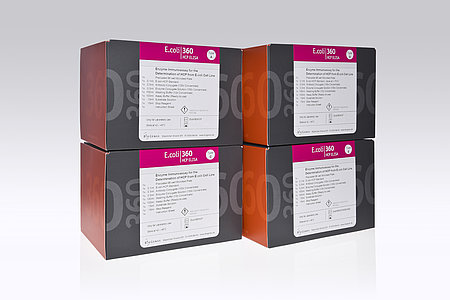E. coli HCP ELISA

E. coli cells are widely used to produce biopharmaceuticals. During drug development, the analysis of residual Host Cell Proteins (HCPs) is important for ensuring the quality and safety of biopharmaceuticals. For E. coli, the HCP pattern is strongly influenced by the applied manufacturing conditions. A traditional generic assay with only one set of antibodies does not adequately represent this diversity. To overcome limitations connected to traditional generic HCP assays, BioGenes has developed the enhanced generic E.coli|360-HCP ELISA, which is composed of a set of four different generic kits.
Four E.coli Kit Types
The E.coli|360-HCP ELISA kits are based on different sets of anti-HCP antibodies, organized into four kit types (Type A, Type C, Type D, Type E), for optimized HCP detection.
- The specific antibodies are generated by parallel immunization of goats and rabbits
- Genetic background of the E. coli antigens: BL21 (DE3) or W3110
- Fermentation media: LB Medium or Mineral Medium
| Type | Cell Line | Growth Medium | Species |
| A - 2G | BL21 (DE3) | Mineral Medium | Rabbit |
| E | W3110 | Mineral Medium | Rabbit |
| D - 2G | BL21 (DE3) | LB Medium | Rabbit |
| C | W3110 | LB Medium | Goat |
E.coli|360-HCP ELISA Performance
The E.coli|360-HCP ELISA method was qualified at BioGenes according to the respective ICH-Guideline ICH Q2(R1).
High specificity of the antibody preparations was demonstrate by coverage of ≥ 80% of the respective E.coli|360-HCP antigen populations. Antigen coverage was measured by a 2D Western blot with Cy5-labeled E.coli|360-HCP standard and the corresponding Cy3-labeled anti-HCP antibodies.

The recovery rate was estimated in spiked samples within the assay working range with concentrations within the assay working range and an acceptance criterion of 100±30% of spiked antigen recovered. The high sensitivity of E.coli|360-HCP ELISA kits is demonstrated by the validation parameter LOD and working range, as shown below:
- Limit of Detection (LOD): ≤ 2.0 ng/mL
- Working range: ~ 2 – 100 ng/mL
Qualification Report for BioGenes' E.coli HCP ELISA (Type A 2G & D 2G)
The HCP pattern in E. coli is influenced by many factors
1) Genetic background of E.coli strains
The genomes of different E.coli strains show remarkable diversity. Although the typical E.coli genome encodes approx. 4,500 - 5,000 genes, only approx. 50 % of those genes represent the core genome. It is estimated that the pan-genome of E.coli comprises approx. 128,000 genes, and thus carries a large number of potential HCP species.
2) Cell cultivation conditions
The gene expression of E.coli is highly dependent on the growth phase of the cells, the type of media and supplements as well as the growth conditions. The re-organization of central metabolic pathways, the expression of stress-related genes and the secretion of enzymes for substrate-degradation are mainly influenced by the availability of nutrients and the presence of cell stress conditions such as temperature, oxygen and salinity.
3) Properties of the recombinant drug
The over-expression of a recombinant (foreign) protein can lead to significant changes in the proteome of the recombinant strain with respect to the expression patterns of metabolically functional proteins, chaperones and heat shock proteins.
BioGenes' recommendation: Due to the difficulties of predicting the HCP spectrum in E. coli, we recommend testing our Starter Set including all four kit types first and then selecting the best performing kit according to ELISA key parameters (such as dilution linearity, accuracy and total coverage) for use in all subsequent tests.
